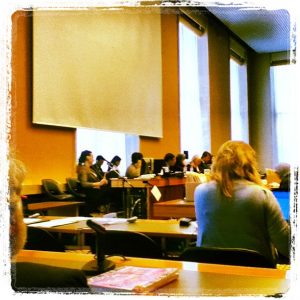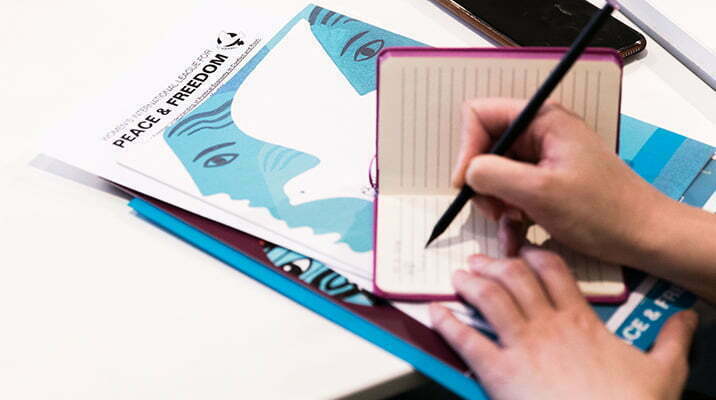In Pakistan, the 12th of February is the national women’s day, which happened just at the right time, since here in Geneva it was also the day of Pakistan’s review for the Committee on the Elimination of Discrimination against Women (CEDAW).
In the course of this interactive dialogue, the CEDAW experts raised many questions for the Pakistani delegation and pointed out multiple problems facing women of Pakistan.
Ending violence against women
Following up on a survey performed in Pakistan by IANSA Women and on our oral statement delivered at the review, an expert of the Committee, Patricia Schulz, called the delegation out on the issue of small arms’ sale and trade, which underlies domestic gun violence against women. She wondered whether the State party had a plan to strictly regulate the sale and trade of small arms. WILPF regrets that Pakistan’s delegation solely claimed that arms have been flowing from Afghanistan where they were first used during wars, and thus the introduction of arms in Pakistan would be difficult to hold back. We need to remind the government of Pakistan that it is their obligation under due diligence to ensure that arms flow do not contribute to increase violence against women.
 However, the fact that the issue of small arms was taken up by the CEDAW Committee in this context is an important further step in the human rights integrated approach that WILPF is supporting. The involvement of small arms discussions within the CEDAW Committee session shows recognition of the fact that women’s rights cannot be discussed in a vacuum, separate from all peace and security issues. We therefore salute Patricia Schulz’s intervention and encourage the Committee to continue in this line of an integrated approach to human rights.
However, the fact that the issue of small arms was taken up by the CEDAW Committee in this context is an important further step in the human rights integrated approach that WILPF is supporting. The involvement of small arms discussions within the CEDAW Committee session shows recognition of the fact that women’s rights cannot be discussed in a vacuum, separate from all peace and security issues. We therefore salute Patricia Schulz’s intervention and encourage the Committee to continue in this line of an integrated approach to human rights.
The appalling issue of honour killings also featured prominently in the discussion. The Committee expressed its concerns regarding the fact that national laws do not hold perpetrators accountable of such crimes and even encourage honour killings. Qisas and Diyat provisions allow for a compromise or pardoning of the killer by the heirs of the deceased, this has been widely used for cases of honour killings, specially as very often perpetrator and victim belong to the same family.
Another concerning violation of women’s human rights in Pakistan is the use of acid to burn women as a way of punishment. The new bill on acid control and regulation declares acid throwing as illegal and deals with punishment of the perpetrators, but does not contain any particular provisions on reparation of victims. Furthermore, it is also only applicable in Islamabad, which is not even the largest city in Pakistan!
Women’s trafficking was also an issue of great concern for the Committee, since Pakistan has no comprehensive legislation dealing with all forms of trafficking, while it is both a transit and destination country for such trafficking. The committee denounced the failure of the Pakistani government to tackle the roots of trafficking, as well as the lack of compensation for and rehabilitation and protection of victims. The delegation replied that the new law on trafficking was still being blocked by the Parliament, in particular by the right wing. The negotiations with the government are still in progress.
Political and legislative issues
The members of the Committee then asked about the lack of implementation of the CEDAW Convention through national laws. Part of the legislation on women’s rights is not in line with the Convention, but the delegation of Pakistan replied that most of these discriminatory laws that are not in conformity with Pakistan’s international obligations have been adopted and implemented by the former regime and not in the frame of a democratic process. Cancelling such legislation would now require political consensus, which is, according to the delegation, quite difficult to achieve in this country. It is however Pakistan’s obligation to conform its domestic legislation with its international obligations including CEDAW, regardless of its political context as the Committee pointed out.
The serious lack of political empowerment of Pakistani women was also a concern. There are currently only 60 seats reserved for women in the national assembly, which is less than 18% of total seats and they still remain understaffed at the local level. Indeed, the separation of powers in Pakistan gives little power to local governments, and as a consequence, little space for women at this level. Yet, the delegation asserted that though the number of women implicated in the political life is constantly increasing, some quotas are still unfilled because there are unfortunately few female candidates willing to apply.
Right to education
The members of the CEDAW often made references to Malala, and for good reason: girls’ access to education remains particularly difficult, especially in some remote rural areas of Pakistan. Girls are still suffering from discrimination in education, as many families with limited resources still prefer to send boys to school rather than girls. Moreover, religious arguments continue to be invoked to oppose to girls’ education, even if the Koran promotes the right to education for everyone without any gender distinction.
 However, the delegation asserted that there has been a change of mentality in recent years and that many families now have the desire to educate their daughters. Yet, security in girls’ schools remains a great concern: many of these schools are bombed by terrorist and extremist groups, in particular in some areas. The CEDAW committee denounced the strong cultural factors and traditional stereotypes still blocking girls from education in Pakistan today, regardless of whether this supposedly only happens at a local level.
However, the delegation asserted that there has been a change of mentality in recent years and that many families now have the desire to educate their daughters. Yet, security in girls’ schools remains a great concern: many of these schools are bombed by terrorist and extremist groups, in particular in some areas. The CEDAW committee denounced the strong cultural factors and traditional stereotypes still blocking girls from education in Pakistan today, regardless of whether this supposedly only happens at a local level.
Women’s health
Pakistan’s laws ban abortion for non-medical reasons and thus many Pakistani women undergo illegal abortions. The CEDAW Committee expressed its concern regarding the high maternal mortality, which could be explained, according to the State party, by the long distance from rural villages to care centres and by the lack of information provided to pregnant women.
These challenges that most rural women have to face are a threat to their right to health and to life. The Committee called for a higher budget allocated to health care and for more education and information on contraceptives and pregnancy.
Women in family law
Finally, it was discussed how extremely difficult it is for a Pakistani woman to leave her spouse: indeed, whereas men can easily ask for a divorce, women do not enjoy such an option. If they want to obtain a divorce, the procedure is incredibly intricate and challenging and often even impossible.
The CEDAW also mentioned other issues such as the legal age of 16 for marriage for girls, the non-recognition of marital rape as a crime and the property of women in case of separation.
What to do now?
The process of human rights review does not end at the review itself, it is a continuous process that civil society needs to be involved in to ensure the supervision of the implementation of observations from the Committee.
The concluding observations of the Committee, which are a great tool for advocacy, will soon be available on the CEDAW 54th Session page. It is the obligation of the Member state to widely share the content of these concluding observations in the local languages, and the civil society should also contribute to the public awareness of the results using adapted resources that speak to everyday life situations.
Civil society should also monitor the implementation of the Committee’s concluding observations and be involved in the implementation assessments and bring up the observations in many different fora, either international or national.





